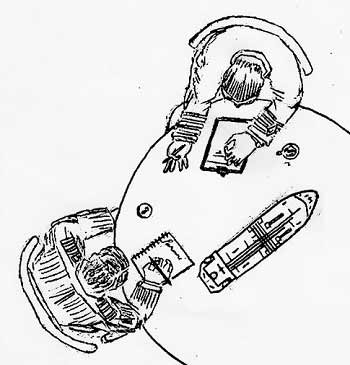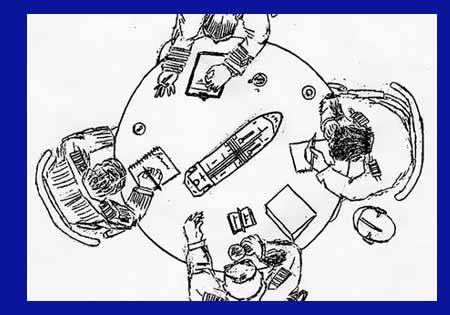“I don’t agree to meetings or calls with no clear agenda or end time. If the desired outcome is defined clearly with a stated objective and agenda listing topics or questions to cover, no meeting or call should last more than 30 minutes. Request them in advance so you can best prepare and make good use of the time together.”
- Tim Ferris, the author of “The 4-hour Workweek”
On a fine day in early 2005, the Master of the ro-pax ship Arahura planned to carry out an emergency steering drill as was required by regulation. Usually the crew tested the non-follow up (NFU) system for the drill but on this occasion, the Master decided to test the steering with the solenoid valves in the machinery space. Problem was, he didn't inform anyone else of his intentions until the last moment.
The Master went down to the steering gear where he found that the 1st Engineer was not available due to some other priority work. The Chief Engineer expressed his concern of carrying out this unplanned procedure but the Master insisted, based on his experience with a sister ship. When ordered to move the rudder to starboard, the crewmember operating the solenoids, due to an incorrect marking with the solenoids, moved the rudder to port.
On the Wheelhouse, the 3rd Officer and Cadet were unaware of the details of the steering drill. And when the rudder went mistakenly to port, they informed the Master of the need to put the helm to starboard but did not mention the presence of another ship in the vicinity. The Arahura now started swinging wildly to starboard and due to the alertness of the crew on the other ship, missed a collision by just 3 cables.
Among other factors, the investigating authority, Maritime New Zealand found that:
• The Master of Arahura did not hold a prior meeting with the senior engineering officers to discuss the technical aspects of the drill.
• The Master did not inform the drill team or bridge that the execution of the drill would involve a different test method.
• The Master did not hold a pre-planning meeting to discuss the drill and how it would differ from the test method that had been used previously.
Meetings are where team focus is achieved. Here, we set up an atmosphere where the team members get comfortable communicating with each other. These meetings are very important for safety so each person knows what the others are doing and they avoid incompatible tasks. It’s also a good place to share problems so you can get inputs and even offers to assist from the rest of the team.
Here’s how to make meetings effective, whether at sea or on land:
1. Set up meetings at regular intervals. Don’t just have them when you’re having problems. The MAIB investigated a fire-related fatality on the Arco Avon where the third Engineer had worked on a failed fuel pipe without informing anyone. His reason for not doing so is likely to have been influenced by the on-board culture of routine lone working and absence of regular and frequent communication.
While it is very tempting to put off meetings under the pretext of being busy, my experience has taught me that these meetings should not be cancelled unless there’s a pressing reason to do so. You’ll be amazed at how many new challenges come to light during such meetings.
2. Cap them at 30 minutes. Start and finish on time; finish earlier if no one has anything more to add.
3. Always announce the agenda at the outset. It helps people to prepare and set expectations. A template helps to get the meeting off to a quick start and in the required direction. When you structure your meeting, the entire crew will appreciate your taking their valuable time into consideration.
4. Set an amiable atmosphere. Sit or stand in circles. Prohibit the use of electronic devices unless it’s for taking notes or referring to the agenda.

5. Take notes. Record comments and draft an action plan.
6. Encourage participation. Meetings are not the place to display authority, order, shout, argue, or preach. Limit the time each participant gets to speak. Draw out reluctant speakers by asking them open-ended questions such as: Is there anything we have not considered?
On the bulk carrier, the Great Majesty, the Master, Chief Engineer and Chief Mate met to discuss the operability of the ballast pumps. The Chief Engineer simply replied that one of the pumps could not be used. The Chief Mate did not seek to clarify if there were any other restrictions in using the ballast system, neither did the Chief Engineer elaborate.
Actually, when the ballast pump was disassembled for repair, the suction pipe and valves were not isolated. When the Chief Mate remotely opened the pump’s suction valves, the open pump’s casing was connected to the main seawater line, which resulted in the flooding of the Engine Room.
7. Conclude. Discussions are great teamwork tools, but they must always end in action plans. The last two minutes of the meeting should be spent summarising who will do what, by when, and how you will communicate.
8. Motivate and Energise. I’ve always found meetings to be a good way to connect with and motivate my team. Getting an opportunity to speak also helps team members build self-confidence. In addition, regular meetings help assess people’s individual capabilities, which is very important for a leader to know.
Meetings are a great opportunity to clarify issues, sharpen focus and align the team with the objectives. They help support a robust safety culture on the ship. Meetings are a great leadership and teamwork tool, and effective leaders run productive meetings.
What else do you do to make your meetings matter?
References:
Accident Report Arahura & Santa Regina Close Quarters Situation in Cook Strait on 27 January 2005
Marine Accident Investigation Branch, U.K., Report no: 17/2016, Arco Avon
Effective meetings are discussed in greated detail in the book Golden Stripes- Leadership on the High Seas, available from Whittles Publishing, and on Amazon.


